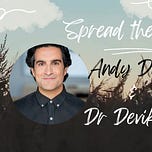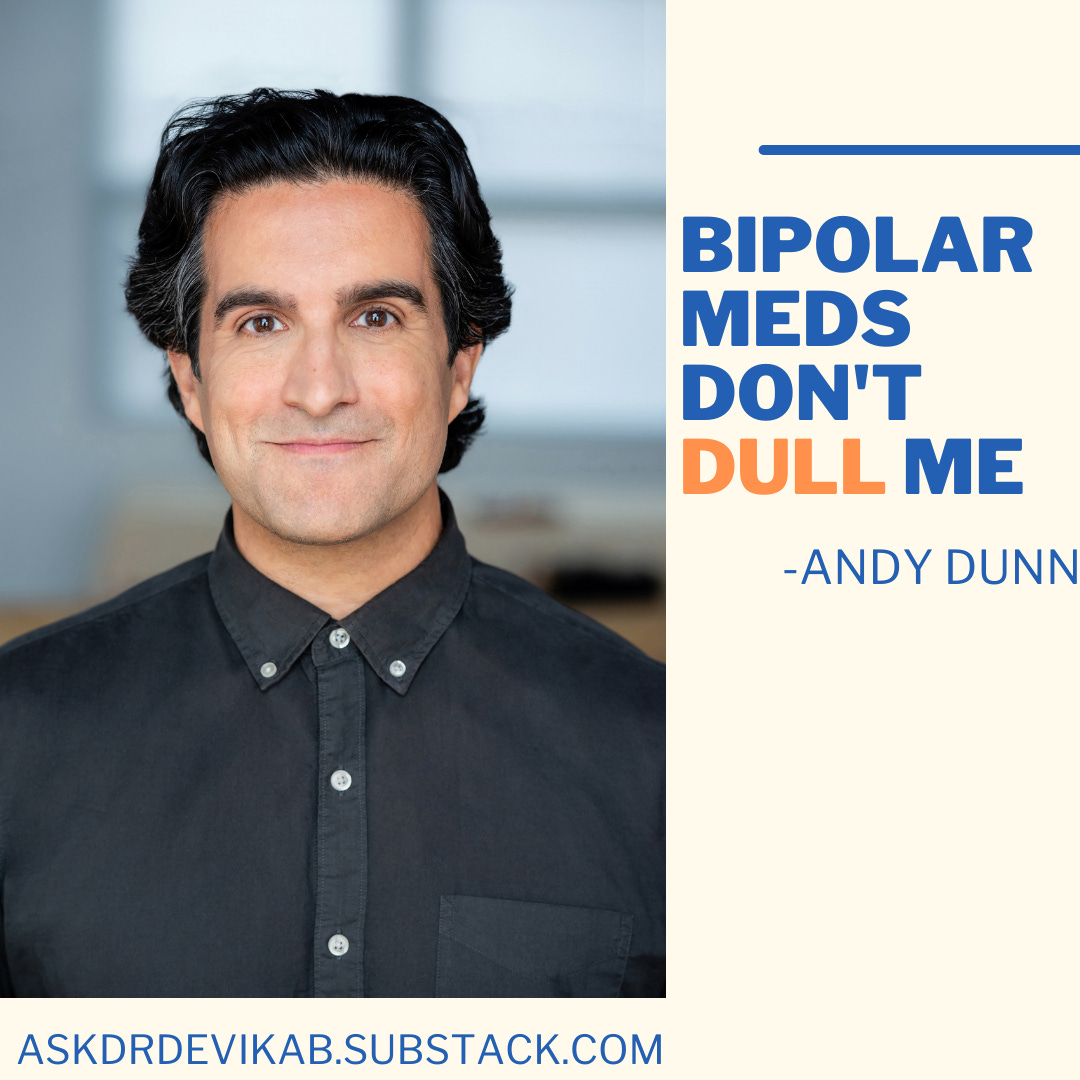Dear community,
As promised, to round out Mental Health Awareness Month, we are featuring our second of two special Spread the light editions.
💫 Spread the light with Dr Devika B. First-person accounts of living with mental illness that dispel stigma and stereotypes and instead, spread hope and light — also a YouTube channel and podcast on Apple and Spotify
Because stigma festers in the dark and scatters in the light
Listen to insights from my friend Andy Dunn’s remarkable journey with bipolar I disorder — a ghost that was hidden and created chaos for years, but today is beautifully harnessed. Our conversation ranged from atoning for and forgiving ourselves for illness moments — to all it takes to tame the ghost — to the intersections between entrepreneurship and mental illness — to the future of mental health.
Andy Dunn is an entrepreneur, author (of his memoir Burn Rate), investor, and father. He co-founded the men's wear brand Bonobos and just released his TED talk, Lessons from losing my mind.
Trigger warning: In this interview, we talk about suicidality, depression, psychosis, hypomania, and mania.
Above, you’ll find the audio recording of the podcast episode and below, a transcript. The written version of the conversation has been lightly edited for clarity and length.
If you’d prefer to watch this conversation, please click here.
If you or a loved one needs help for a mental health crisis, don’t hesitate to call or text 988 — or reach them online here. Find other resources here, search for a US treatment facility here, and find a US-based therapist here.
Wishing you light,
Dr Devika Bhushan
DB: So Andy, tell us about how your mental health journey started.
AD: It started with a diagnosis that I was wholly unprepared for, and therefore in abject denial of for the next 16 years, which is too long.
And a big part of why I care about this mission of talking about mental health is to decrease the time from diagnosis to acceptance. Because these things are difficult enough without the denial. And obviously the denial is rooted in the stigma and it's a vicious cycle.
But for me, it began when I was 20. I was a senior in college. I had a severe manic episode — psychosis, messianic delusion, racing speech. It was a mixed manic episode, which means alternating between euphoria as well as profound sadness — you know, crying, then moving to angry, the standard manic playbook of being the second coming of God, or retrospectively, humiliating things that made this so difficult for me to talk about…. I was diagnosed with bipolar I. It was January 2000. I was a senior in college and that was the beginning of the journey.
We didn't talk about it. With my Midwestern upbringing — you know, Punjabi Indian immigrants on my Mom's side, Scandinavian Midwesterners on my Dad's side — very different cultures, but with a unifying attribute: which is just a total desire to not talk about or engage in issues of mental health.
Certainly that was the case 23 years ago. Hopefully it's evolving.
DB: What were the hardest parts of your journey?
AD: I think that the worst moments for me with bipolar were the phases of depression where I didn’t want to live and feeling so ungrateful for this life. To have so many things to live for, but to not actually want to live was just a very strange thing.
Those moments were hard and, you know, would come and go for eight years.
So it was sort of this dance of, ‘I'm feeling good, I'm feeling hypomanic. I'm coming a little bit off the rails on the high side, but I'm energized. I'm working hard…’ And then slipping into this blackness, usually lasting between one and three months.
And unfortunately, not being in therapy, not being on medication, not seeing a doctor — due to my inability to accept it.
And those periods of just being like, ‘When does this ascend; how do I get out?’
And then on the flip side, the manic episode that I had in 2016 included an episode of of violence, and I was charged with felony and misdemeanor assault. And thought I would lose everything I cared about.
It's just horrible to go through the legal system, to go through that sense of professional collapse — like my career’s over, right? And then the fear of losing my then girlfriend who was the love of my life, and the first person that I thought maybe we would spend our lives together.
So to go from so many things going well to just, you know — that.
The lack of willingness on my part to accept what I had, just this sort of calamitous black swan event that wasn't actually a black swan at all. A black swan is a retrospectively predictable event that's unpredictable at the time.
“Bipolar disorder is an illness that can undergird greatness and seek to destroy it at the same time.” —Andy Dunn, Burn Rate
It's very easy to predict another manic episode if you have bipolar I, right? It's part of the deal.
DB: And Andy, how did you come to a place where you were able to accept this disorder as a part of your life and the need for treatment?
AD: I had a former psychiatrist who was an executive coach and he, while I was in the go-go days of building my startup, was the reason that I thought maybe I didn't have bipolar. I told him my story, and he knew me well. He knew the ups and downs, and he felt that my ups and downs were within bounds of this startup rollercoaster.
I talked in my TED talk about how being an entrepreneur can be a cloak for a mood disorder.
[B]eing an entrepreneur can be a cloak for a mood disorder…. There can be ups and downs… It can be a way to conceal the underlying mood disorder that might be amplifying those ups and downs.
And so I had a lot of people fooled because they were just like, ‘Yeah, of course this guy's off the rails. He's an entrepreneur, right? Of course he disappears at times because entrepreneurs are mercurial.’
So he [the executive coach] actually solidified my desired narrative that this diagnosis had been an error.
And because I had been using psilocybin around that time, there was a narrative advanced that my 20-year-old psychosis was actually substance-driven. I was taking a powerful acne medication at the time that was linked to mental health issues. I think that’s sort of dubious in retrospect — that probably was more of a coincidence.
So when I had the second catastrophic episode in 2016 — look, I was 36 years old, which is very different than being 20. I'd been through more stuff. And in a way, I wanted this explanation for the depression that I dealt with.
He actually made the referral to my now psychiatrist and therapist. And I remember sitting down with him — I had to find a venue where I wouldn't be tempted by alcoholic beverages. So we had a meeting at this tea shop in midtown.
And I said, ‘Hey, I kind of do have this bipolar thing, don't I?’ Because he had told me that I might not, and I needed to hear it from him. And he also had been so helpful prior — helping me navigate the ups and downs, even if the bipolar was concealed.
And then he was the person that referred me to the doctor that I was about to start seeing.
It was without a doubt at this point, right? Because the mania came back.
And then I just so badly to be better.
I didn’t want to put my family through what they'd just gone through. I didn't want to lose Manuela, who's now my wife. I didn't want to lose my job. I didn't want to be violent again.
I wanted to do everything in my power now with an unvarnished, clear-eyed, deep acceptance that this is my cross to bear. (But with a lurking messianic delusion, we shouldn't be talking about crosses to bear.)
I had no doubt that this was my illness. I met every DSM criteria, 100%. So it was like, ‘All right, let's go — let's get healthy.’
DB: Looking back at that whole journey and knowing everything you know now — about yourself, the disorder, your profession, your personal life — what would you go back and tell your younger self, young Andy at 20 when you first had that manic episode, or during those depressive episodes?
AD: I would say: First, I'm so sorry that you have to take this on. This is a heavy thing to take on.
And I have such good news for you — which is it's eminently treatable. This is something that you can deal with — you can do this, you can keep this contained.
This isn't a death sentence. This isn't even something that means your quality of life inevitably will be diminished.
But you have to deal with it.
You are very likely going to need to take medication every day for the rest of your life. And I know that's a hard thing to hear. But what I'm effectively saying is you have to put a small object into your mouth and drink a half a glass of water with it.
That's it. And you're probably gonna need to see a physician with some meaningful frequency, or a combination of a psychiatrist and a therapist.
And by the way, that probably sounds bad, but you're going to find one day it’s a gift in its own right to be able to do therapy, that it's actually going to improve your quality of life.
Because life is hard — separate from bipolar disorder — and having someone trained who you can process your life with is going to make you a better friend, son, communicator, employee, all these things.
And so just take a beat right now and take your meds and see a doctor and let's walk through this together for the next, you know, six or eight weeks. It's going to take you a while to feel well.
And I have some good news: Neurodiversity, when contained, can be an asset, too.
And let me tell you about famous people from history who have had bipolar disorder. Let's talk about Alexander Hamilton. Let's talk about Vincent Van Gogh.
It can be a superpower, too, but it has a kryptonite. And so let's figure that out.
Maybe one day you'll even look back at this as something to process with gratitude — that you were gifted with this superpower — if you're willing to contain the challenges, the harm that it can do.
DB: You powerfully busted the myth that bipolar medications don’t necessarily dull you with our community for World Bipolar Day. What’s another mental health myth you’d like to settle the score on?
AD: What comes to mind is the idea that you're somehow different [if you have a mental illness and bipolar disorder in particular] — it’s true and it’s false.
The truth is that you have this particular stripe of neurodiversity that maybe 1 to 3% of adults live with bipolar. But setting that aside, you're joining a pretty big club, right? So we think one third of us live with some kind of mental health condition. In the little world I swim in of creative entrepreneurs, that number might be as high as [~50%].
And look, here's the deal. The other [50%] of us will, at some point, face an acute issue of mental health. Because mental health challenges don't require a mental illness to become acute or to endure in our lives. There's grief, there's the end of a relationship, there's problematic relationships, there's sexual abuse, there's physical abuse, there's financial stress.
There's not a human that makes it to 40 without being thrown on their ass by something. We all have mental health.
And then to the extent that you want to talk about mental illness, there's no family unaffected if you look as wide as cousins and as far back as grandparents.
So you're not so unique. You've just been included in the human condition in a unique way.
So don't take on this idea that you're somehow different — or as I did, like you’re some kind of human stain. I felt like I was bad — I was broken. And it’s not true. You’re not.
DB: Amen. How has your mental health journey shaped your superpowers?
AD: One thing I was really worried about going into the era of taking medication was would I be able to access that kind of sparkly mood?
You know, where it feels like a lot is possible, and where I feel up in a way that is good. And there can be a contagious, positive energy to someone in a hypomanic state: you’re full of ideas, little looser, verbally funnier, more candid. People who are in a hypomanic state can make you believe and inspire you and make you laugh, and you want to be around someone in a hypomanic state.
DB: [Here, I interjected with how it can be tough to be around someone who’s hypomanic, because they are not good at listening or following through on their ideas. And by the way, my own experiences of hypomania have been routinely unpleasant for me and those around me: I’ve been revved up in a dysthymic direction — anxious, irritable — not effervescent.]
AD: Setting aside the bad stuff and focusing selfishly on the good stuff, I was afraid I wouldn't be able to access that state. And my doctor helped me and he said, ‘Look, the goal is not to ward off peak life experiences. It's to make it controllable and to not let it slide up into an unhealthily high level of hypomania, let alone mania.’
So we used to talk about the scale of mood from one to 10, where one was catatonic depression and 10 was mania. And nine is dangerous hypomania and eight’s getting close.
How do we get the mood band that I would live in between five and seven, so that there was no day that was below a steady Eddie. Meaning, avoiding depression, avoiding dysthymia as much as possible. I'm okay with a few fours in there. That's a part of life — got to feel a little low sometimes, but not catatonically depressed or ritually depressed.
To be able to stretch into that seven and maybe sometimes an eight — you know, a day or two. And he said, ‘We need to build a pharmacological regimen for you where you can live at seven to eight sometimes.’ He said, ‘Might we all be controllably hypomanic every day—that would be the dream. If we could all be a seven out of 10 every day, the world would be a beautiful place.’
And so it was very difficult because it took about a year to get there, because my depression coming off of the manic episode was so severe. Six months of just not wanting to live at all coming off of the high, which is also typical. And because of the violence processing and the legal stuff and the job, it was a horrible six months.
And the only reason I didn't succumb to the depression was I was so committed to — it's a weird word, but it comes to my mind — to atoning. For what everyone had just gone through. I felt like everyone deserved a better me than a manic, psychotic, nightmare me. And I was so committed to that on behalf of others.
And I think that's a helpful frame to have: ‘Don't do this just for you. Do it for the people who love you. Do it for the people who are walking through this with you.’ Your mental illness is now their burden as well.
And think of the wonderful things you can do by committing to your own health and doing everything you can to secure it — because it's a beautiful thing for your loved ones, too.
But it took a year to access that.
You know, it's fun to be in a really good mood and I think a lot of folks who have bipolar, who go on meds — because it doesn't work at first; it's not going to work at first — they go off before giving it a chance.
You're going to have to walk this for a year or six months.
People deal with that all the time on the physical illness front: If you blow out your knee, you've got to get surgery and you're in crutches for six months. If you get cancer, you may have to deal with treatment for years.
Life sucks, but you can't go off your meds because you don't feel like you — you just have to keep working through it, you know — until you do.
And I realize there's other kinds of treatments now: There's ketamine therapy and there's the electromagnetic thing [transcranial magnetic stimulation]. There's a lot of momentum with different kinds of treatment, and we should feel lucky.
DB: Our loved ones are really the ones who have the starkest and sharpest memories of what we do and say when we're at our least well selves, right? And part of our journey is learning to forgive our illnesses and our ill selves.
AD: Totally. And one of the gifts of writing this memoir was that I got to go back and interview my family about some of these moments. It's so painful to unpack what transpired during psychosis for the person who went through it — for the people who were there for it.
There's kind of no incentive to do it outside of some supernatural desire for healing interfamilial trauma, which I would never have had the courage to do, but it was only because I needed to write.
The book forced me to sit down with my Dad and say, ‘What did I say to you? You know, when you were sitting on that green chair and I was lecturing you about all the things that White men had done wrong in human history?’
For some reason, I thought my Dad embodied all of that. And I wanted to just grill him on why all of his heroes were White men.
Or sitting down with my Mom and saying, ‘What happened on the sidewalk on Fifth Avenue? Like, did I throw you into a fence, Mom? Like, what happened?’
Oh my, I could shed a tear now thinking about it, if I hadn't done so much therapy around it.
The unpacking of it is also traumatic — revisiting it and seeing family revisit it.
Like, who wants to have that conversation when your loved one is back? And so this memoir for me such a gift because I got to take an author's distance from the vantage point of six years and 1000 therapy sessions later.
That I was able to sit and have those conversations and to hold those feelings. And be like, ‘Okay, that wasn't my fault. It wasn't.’
What would be my fault? It would be my fault if I maintained the denial. If I continue to reject care — that would be my fault.
And I think it's important to parse those things:
You did nothing wrong. But you might do something wrong going forward. If you don't deal with what went wrong, you are now doing something wrong.
DB: You’ve talked about medication and therapy as being key to your mental health. How else do you maintain your mental health? And when you do start to notice red flag symptoms, what do you do differently?
AD: Awesome question.
Maybe the most important thing for me is sleep. Sleep is either a lagging or leading indicator for me of a mood swing.
I sort of know without fail that if I start sleeping eight hours, 8:15, 8;39, 9:15, 9:30, 10, that I'm headed into a depressive state — because for me, depression manifests as can't get out of bed.
The flip side is hypomania for me starts as sleep descends below six hours. So five and a half, five, four and a half, four. You know, the alarm bells start to go off. And then if it gets to three, two, it starts to get scary and raise the flag pretty highly on that.
And then two zeros in a row is mania — effectively. I can actually get through it a sleepless night and kind of get squash it the next night and not slide into a manic state. But you know, two zeros has happened three times in my life, and all three have been mania or on the verge, which is, for me, an unacceptably high risk to take.
Which means that I need to head off those mood swings. Like the time to address it isn't when it's two hours — it's when it's going from five to four, when I'm still functioning.
There's plenty of parents who woke up this morning who slept four hours last night, and they're going to have to do their whole day.
But for me, I just can't afford to do multiple four-hour days, so I have to take extreme measures — like cancel work. I've got to treat it like a sick day, like I’ve got the flu. I’ve got to tell everyone, ‘Hey, I need to take the next two days off and get my sleep back on track.’
So the first step in that is just transparency around sleep. So every morning, you know, the first thing I do is I take a Fitbit sleep report and I take a screenshot of it. This is this morning's: seven hours, five minutes; an hour and 40 minutes of REM. So I can see from my sleep reports what's happening mood-wise.
And then I send it every morning to a WhatsApp group that has my doctor, wife, sister, and Mom. They need to know — my sister and Mom — because it helps them sleep better at night.
We all understand how clearly if I'm between six and eight [hours], I'm just a straight-up non-mood-disordered person. Like, I'm just solid — I'm asymptomatic entirely. (Plus the therapy and the medication.)
I shouldn't make this joke, but I feel like I'm one of the most stable people in the world if I've slept the right amount. Because I've got an amazing medical regimen, too.
It all ties together with medication. We've figured out, all right, what's the one medication I take every day? It's a mood stabilizer. It's like my ride or die. I'm like in a relationship with this medication. I love it — it's bedrock to my life.
Then we have four others that get dialed in, depending on what’s going on — and there's one medication that I call the hammer. Where if I'm headed up into mania, hypomania, it's like a blanket that gets thrown on me. You know those like 30-pound, 40-pound blankets? It's like 100 pounds.
I'm just dead for two days and it sucks. It's the worst. But I also love it because I know it's preventing a manic episode. It's an antipsychotic that basically is like, you're done. Sorry — your flight up into psychosis was fun — we know. We know you want to save the world, but you're toast and you're going to be very fuzzy next week.
And that's just the price that I pay.
What I do when I see my sleep going down is I focus on like the lighter medications to enable me to sleep because I don't want to get to that level of having to call in the hammer, as my doctor calls it.
And we could talk about nutrition. That's kind of a new frontier: metabolic psychiatry. A great book that just came out called Brain Energy suggested ketogenic diet is good for bipolar. So I've been playing with that — which is a hard diet to keep — but I've actually been enjoying it, mostly because I lose weight and just feel better.
It takes a total regimen: Sleep, nutrition, exercise, physician, therapy, and medication.
It's also really good for life to have this regimen — you know, more is possible.
DB: These are strategies that folks who have serious mental illness, like you and I, we have to uphold and protect, at the cost of sometimes other obligations. But they're really strategies that are useful for anybody — because like you said, life is hard. And if you have ways of protecting and bolstering yourself, and really feeling like the best version of yourself — that’s useful all around.
So one last question for you, Andy: What are your hopes as you look forward to the future for all of us collectively?
AD: You know, I happen to work on a new project where the goal is to get people together in real life, in small groups, kind of restoring our tribal innate nature. And I think our nature has been infringed upon by smartphones, and lots of other things.
My worldview is: Mental health affects 100% of us. And we don't really fund it. We don't invest in it.
A really easy example is if you have a premier employment situation, you probably have on top of your regular medical health insurance, dental and vision. And the reason you have dental and vision is that your medical health insurance doesn't reimburse for dental and vision.
Well, that's kind of the situation with mental health, right? The reimbursement rates are so low.
My therapy, for example — my doctor’s wildly good and wildly expensive:
It’s $1000 for 45 minutes. It's insane. Whatever, pun intended.
And you know, my regular health insurance reimburses $90. Who can afford $910 out of pocket twice a week? I can barely afford it because I've been so lucky in the business world.
So the ability to find the right care and then to pay for it is a massive thing we need to take on. And it's not like this is not possible, right.
The state of North Carolina has got a bill up right now that is bipartisan for [$1.8 billion] in funding to bolster services for mental health.
So we need to do this. It's an emergency and it's going to require insurance companies to do more. Insurance companies don't have an incentive to do more unless corporations force them to with their collective bargaining power.
And then we need mental health professionals to make it easier to get reimbursed by not doing stuff like, ‘Well, you pay me in cash and then you deal with it yourself.’
We need to come together — government, corporations, insurance companies, and the rest of us that use insurance companies. And we need to put our money where our mouth is on this.
Because like we can write New York Times articles every day on this — we can talk a lot. But if we don't invest in it, we're not going to get that much better.
And when Sergey Brin, the founder of Roblox, [David Baszucki, and Kent Dauton] did this $150 million donation to bipolar research last year, I thought, ‘Yes!’
We're seeing the famous rich people who are affected by this shit actually funding it in a public way. And that's what we need. We need conspicuous disclosure so we can all be like, ‘Oh wait, this isn't just me — this isn't just my family.’
And we need local, state, federal, corporate, the health community — combined effort.
And the best news, by the way, is — and you know this well — it's happening. This is happening. It may not be happening fast enough, but it feels like the zeitgeist is shifting under our feet right now. It's a great time to be alive on this.
















